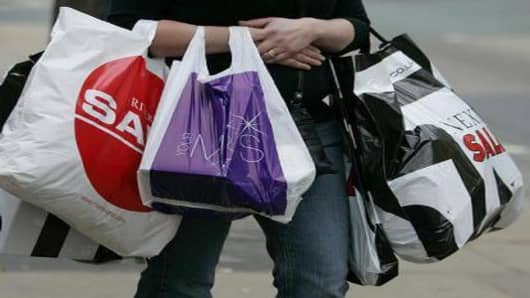Surging food and fuel prices drove euro zone inflation to a new record high of 3.7 percent year-on-year in May, data showed, cementing expectations that the European Central Bank will raise interest rates on July 3.
The European Union's statistics office revised upwards its previous May inflation estimate of 3.6 percent following higher-than-expected price rises in several of the 15 euro zone countries, including the two biggest -- Germany and France.
Prices rose 0.6 percent month-on-month in May, Eurostat said, and 3.7 percent annually -- the highest annual increase since measurements for the zone started in 1997.
This compares with 3.3 percent annual inflation in April and 3.6 in March.
"The May euro zone consumer price data are likely to seal an interest rate hike from 4.00 percent to 4.25 percent at the ECB's 3 July meeting," said Howard Archer, economist at Global Insight.
Economists had expected May consumer price growth at the level of the initial Eurostat estimate, although several had forecast an upward revision after the national inflation numbers came out last week.
Economists expect euro zone inflation to edge up towards 4 percent over the coming months and some forecast the ECB therefore to raise rates more than once.
The euro jumped against the dollar from $1.5429 to $1.5470 after the European Commission, commenting on the data, said inflation was its main economic concern.
The remarks reinforced expectations of more ECB rate rises, traders said.
"The inflation outlook is still worrying. That leaves us on track for more than one rate hike after the widely expected July one," said Nick Kounis, economist at Fortis.
Last week, several of the central bank's Governing Council members had sought to make clear that the possible July rate rise was not likely to be the beginning of a tightening cycle.
Wage Fears
Data on accelerating euro zone wage growth in the first quarter, released last Friday, added to the ECB's concerns because it raised the specter of a wage-price spiral, ECB Executive Board member Gertrude Tumpel-Gugerell said.
But some economists noted that inflation excluding volatile food, alcohol, tobacco and energy prices rose only to 1.7 percent year-on-year from 1.6 percent in April.
Many economists call this measure core inflation.
"A rate increase next month looks like a done deal, but the fact that core inflation remains subdued supports the view that the move will be a one-off," said Jennifer McKeown, European economist at Capital Economics.
Food, alcohol and tobacco prices rose 5.7 percent annually while energy costs jumped 13.7 percent, mainly driven by oil, which jumped from around $110 a barrel at the start of the month to $135 towards the end of May -- twice the year-earlier price.
What the ECB calls core inflation, i.e. stripping out energy and unprocessed food costs, grew to 0.2 percent on the month in May and 2.5 percent year-on-year, up from 2.4 percent in April.
The ECB wants inflation to be just below 2 percent.
It said earlier this month it may raise interest rates "by a small amount" on July 3 to anchor inflation expectations because price growth would be higher and last longer than previously expected.


